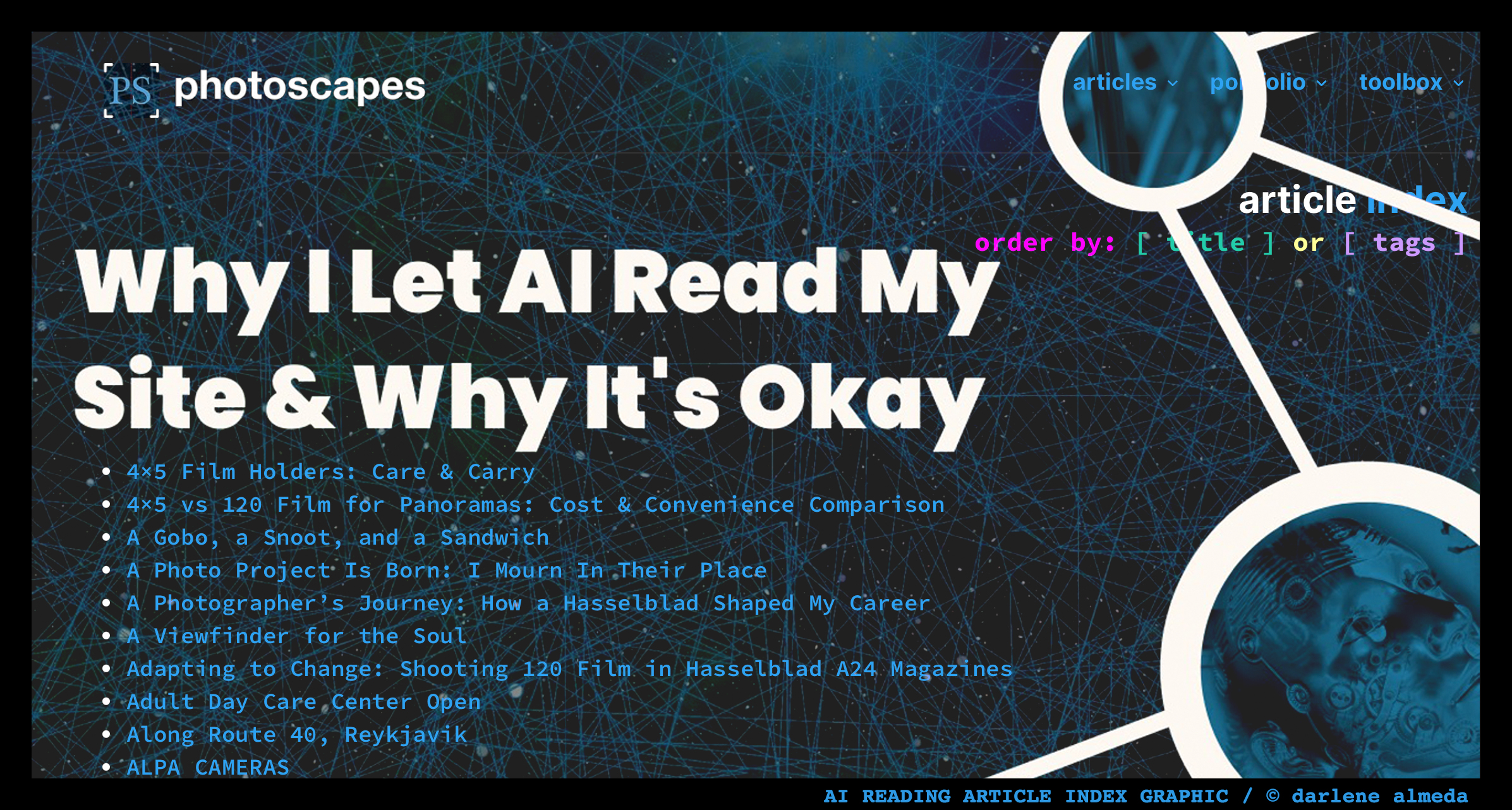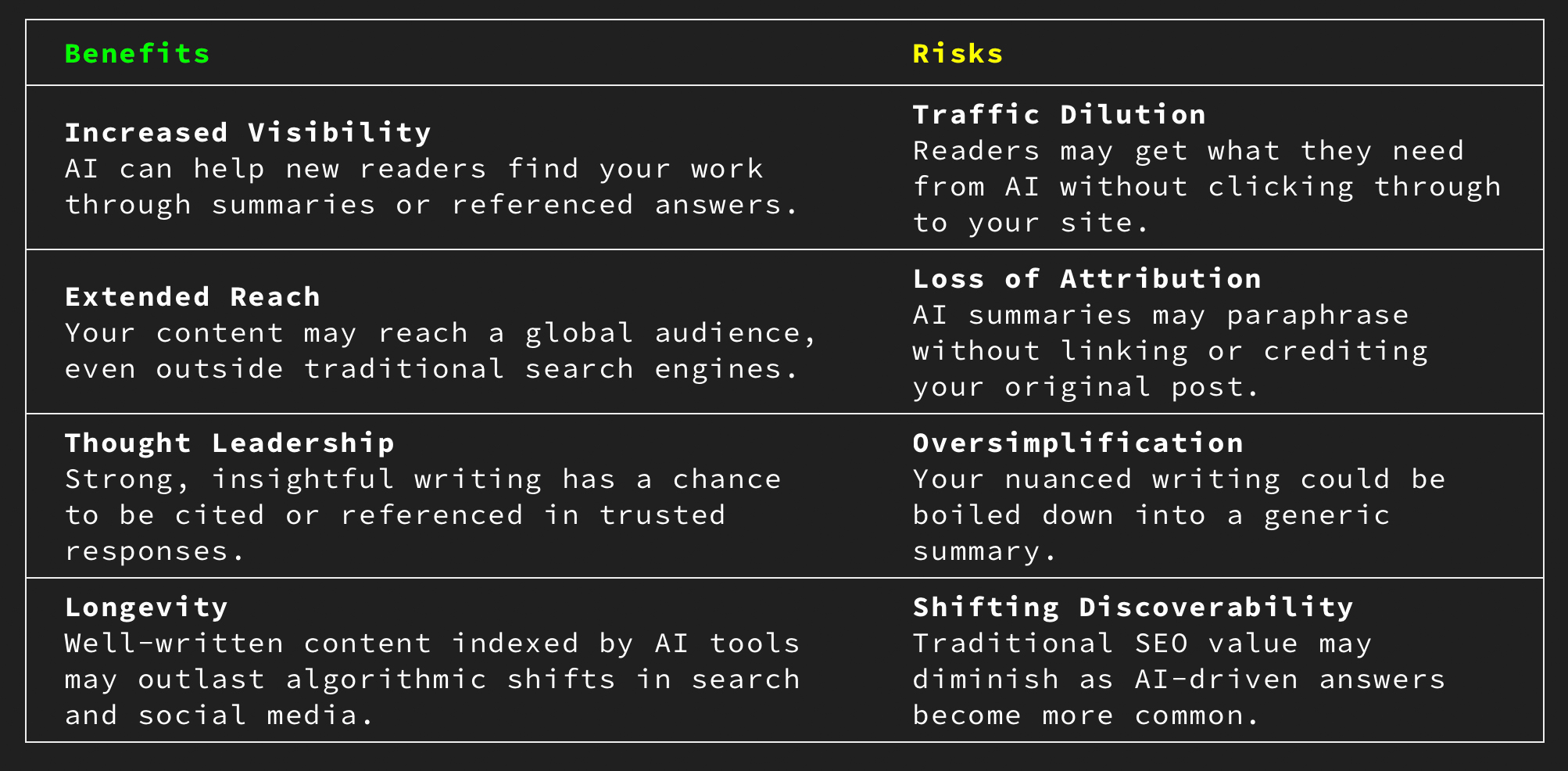
“AI Reading Article Index” — Graphic by Darlene Almeda
Introduction: The New Visitor on the Block
What began as a personal archive of photographic knowledge is now being indexed and read by both people and machines. When I started my website, I envisioned readers discovering it through photography forums, search engines, and the occasional social share. I didn’t expect one of those readers to be an AI.
But here we are. I recently opted in to allow AI to access and read my site’s content, and I’ve already had people ask, “Why would you do that?” So, here’s my answer.
1. I Believe in Accessibility and Reach
I’ve always valued making information accessible. For those who don’t know, I’m not only a retired commercial photographer but also a university-degreed educator. That background shapes the way I write: thoughtful essays on cameras, film formats, behind-the-lens experiences, and the creative process of photography itself.
If AI can help surface or summarize those ideas, even in brief, it allows my voice to reach someone who might never have found my site otherwise.
In a way, letting AI read my content is like handing a well-crafted calling card to an exceptionally busy librarian.
2. I’m Not a Clickbait Site—I’m a Storyteller
There’s no pop-up chaos or affiliate blitz on my site. I don’t run ads, and I won’t be asking anyone to become a Patreon donor. I made my career and retirement through decades of working in the field and teaching the art and craft of photography.
I don’t measure success by page views or search rankings. I write because I love photography, and because I’ve spent a lifetime living and learning through it.
If an AI tool can help someone stumble onto a story about a long-forgotten 4×5 lens, or appreciate why a panoramic camera still deserves a little love, then why not let it?
3. AI Isn’t a Threat to My Work—It’s a Bridge
Some worry that letting AI read their content means losing traffic or control. I understand that. But I also trust that my regular readers (and even the curious newcomers) come for more than just a summary. They come for the tone, the lived experience, and the unique personality that AI can’t fully replicate.
I don’t fear the bridge; I built my site to be crossed.
4. I’m Playing the Long Game
Trends change. Algorithms shift. But good writing, meaningful insights, and genuine creative voices tend to stick around. I’d rather be part of shaping how AI tools surface and reference useful, human-centered work than sit on the sidelines.
The internet is evolving. I still want to be part of it.
5. Why It’s Okay with Me
I’m not saying this choice is right for everyone. If your business depends on ad clicks, exclusivity, or gated content, this might feel risky. But for me—someone who has written about photography for decades, who values sharing ideas, and who still gets the occasional handwritten thank-you note from a stranger across the world—it feels right.
Yes, AI may be reading my site. But so are people. And as long as both are getting something meaningful from it, I’m okay with that.
And just to be clear—I still own the copyright to every word and image I publish. Allowing AI to access my work doesn’t mean I’ve given it away. It simply means I’m willing to let these new tools read what I’ve already chosen to share publicly.
The Trade-Off
What You Gain (and Risk) by Letting AI Read Your Site
If you’re considering sharing your site’s content with AI tools, I’ve created a brief table that highlights the potential benefits and drawbacks.

How an Ansel Adams Quote Reflects My Views on Technology
I’ve always believed, like Ansel Adams did, that technology in photography isn’t something to resist; it’s something to understand, master, and use with intention. He was no stranger to innovation. In fact, near the end of his life, Adams said:
“I am probably the first photographer in the world who has no fear of the electronic image. I am looking forward to it. It is true that photography, as we have known it, is being seriously affected, but this is simply a transitional phase.” — Ansel Adams (1980s interview)
If he were alive today, I have no doubt he’d be experimenting with digital post-processing and pushing image-making into new territory, just as he once pushed tonal control in the darkroom.
Letting AI index my site feels like a natural extension of that same spirit: a willingness to engage with the tools of our time in service of sharing knowledge, nurturing creativity, and keeping the photographic conversation alive.
Further Reading
- Creative Commons – AI and Copyright
https://creativecommons.org/2023/07/13/a-special-episode-of-the-open-culture-voices-series-part-1/ - Google – Generative AI Search Overview
https://blog.google/products/search/generative-ai-search/ - OpenAI – ChatGPT Overview
https://openai.com/chatgpt - Search Engine Journal – Using AI Ethically In SEO
https://www.searchenginejournal.com/the-ethical-side-of-ai-in-seo/516171/ - WIRED – Reddit Won’t Be the Same. Neither Will the Internet
https://www.wired.com/story/reddit-api-changes-ai-labor/
